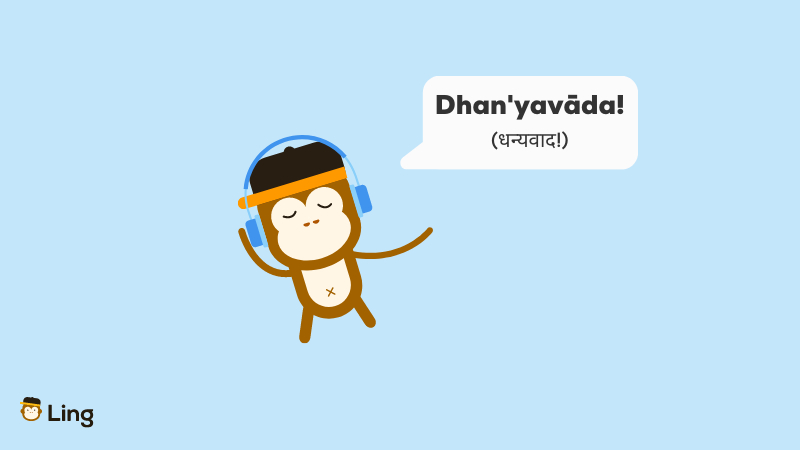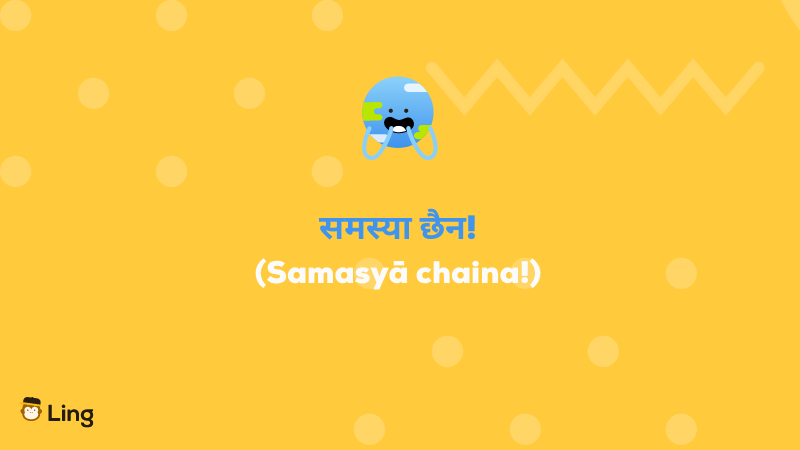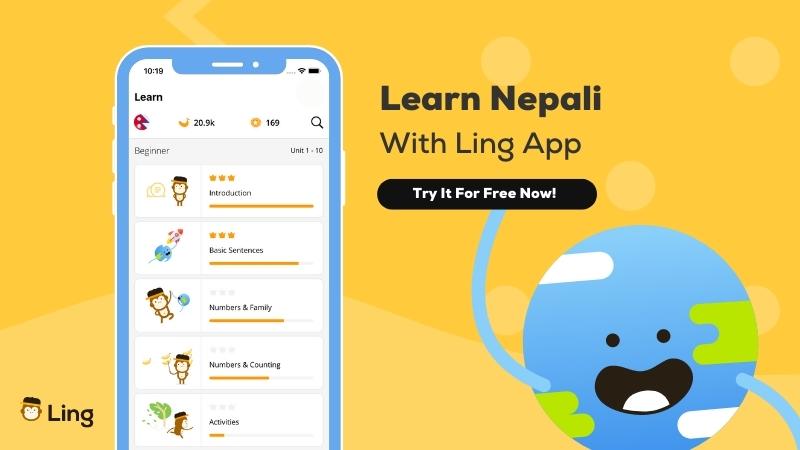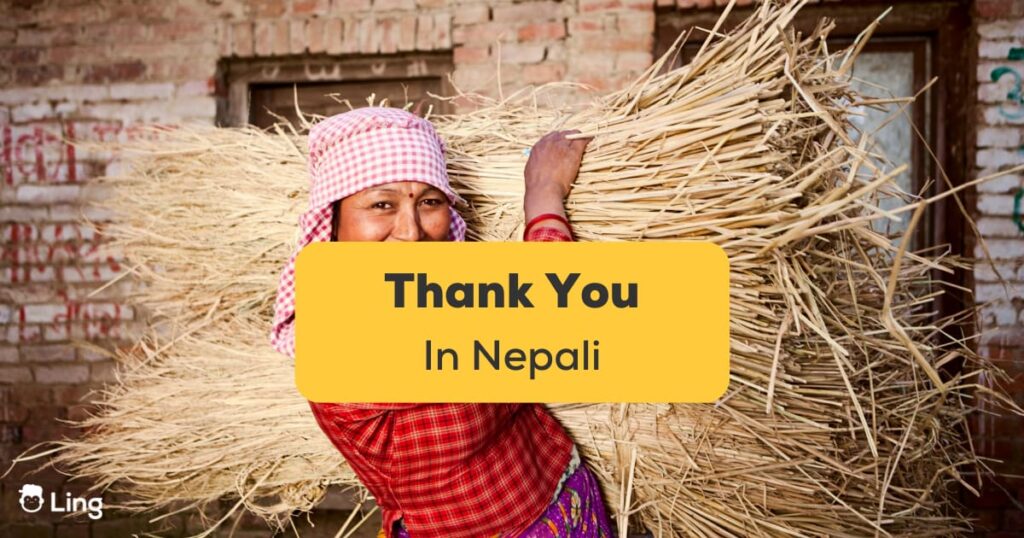Saying “Thank you,” “धन्यवाद,” “Dhan’yavāda” is another way of showing respect and gratitude. Learning to say Thank you in Nepali helps you talk politely with locals.
Nepal is a beautiful country with many awe-inspiring features. Nepalese value both their culture and their official language, “Nepali.” So, if you are going to Nepal, you should know how to say “Thank you” “धन्यवाद “Dhan’yavāda” in Nepali.
Thank you in Nepali is one of the most important phrases to learn because it is useful in various situations. You can use this to ask for directions, order food, go shopping, and have other everyday discussions. It is also a gesture of courtesy and respect among the people in Nepali culture. So, before visiting Nepal, you must learn some basic words from Ling App to talk nicely with natives.
Thank You In Nepali

Formal Ways To Say Thank You In Nepali
One of the best means to say thank you in Nepali is “Dhrai dhrai dhan’yavda!” “धेरै धेरै धन्यवाद!” If you want to be formal, this is the appropriate sentence for you to use.
You can never go wrong with the formal style as a foreigner and non-native speaker. So, this is your go-to phrase for practically every occasion, such as getting services from restaurants or asking for directions. Remember that in Nepali culture, respect is the ultimate key! Here are some basic phrases (formal) to say “Thank you”
| English phrases | Pronunciation | Nepali phrases |
| Thank you! | Dhan’yavāda! | धन्यवाद! |
| Thank you so much! | Dhērai dhērai dhan’yavāda! | धेरै धेरै धन्यवाद! |
| I appreciate your effort. | Ma tapā’īkō prayāsakō kadara garchu. | म तपाईको प्रयासको कदर गर्छु। |
| My sincere thanks. | Mērō hārdika dhan’yavāda! | मेरो हार्दिक धन्यवाद! |
| Please accept my deepest thanks. | Kr̥payā mērō gahirō dhan’yavāda svīkāra garnuhōs | कृपया मेरो गहिरो धन्यवाद स्वीकार गर्नुहोस् |
| My thanks and appreciation. | Mērō dhan’yavāda ra praśansā | मेरो धन्यवाद र प्रशंसा |
Informal Ways To Say Thank You In Nepali
Thank someone close to you who is the same age or younger than you in an informal way. Remember to differentiate between formal and informal means; otherwise, the locals can easily misunderstand you.
For example, in an informal situation with a colleague, say, “Hello and thank you for….” You can translate the above phrase in Nepali as “नमस्ते र धन्यवाद …” pronounced “Namaste ra dhan’yavāda…” Read more informal phrases below.
| English words | Pronunciation | Nepali words |
| Thanks! | Dhan’yavāda! | धन्यवाद! |
| Thanks a bunch! | Ēka gucchā dhan’yavāda! | एक गुच्छा धन्यवाद! |
| You are the best. | Tapā’īṁ sabai bhandā rāmrō hunuhuncha! | तपाईं सबै भन्दा राम्रो हुनुहुन्छ! |
| Thanks, buddy! | Dhan’yavāda, mitra! | धन्यवाद, मित्र! |
| You are awesome! | Timī ēkadama rāmrō chau! | तिमी एकदम राम्रो छौ! |
| I cannot thank you enough. | Ma tapā’īnlā’ī paryāpta dhan’yavāda dina sakdina. | म तपाईंलाई पर्याप्त धन्यवाद दिन सक्दिन। |
Other Basic Sentences To Say Thank You In Nepali
Besides formal and informal ways to say thank you, there are many other methods. For example, to thank a stranger, introduce yourself by saying, “Hi! My name is…, and thank you for the….” “नमस्ते! मेरो नाम हो … र यसको लागि धन्यवाद …” “Namaskar! Mero Naam ho… Ra yasakō lāgi dhan’yavāda…”
If you are communicating for the first time with a local person, your greeting should be polite and humble.
Also, understand that speaking Nepali is essential to deal with the Nepali clients in a company.
| English phrases | Pronunciation | Nepali phrases |
| Thank you for your assistance. | Tapā’īṅkō sahayōgakō lāgi dhan’yavāda | तपाईंको सहयोगको लागि धन्यवाद |
| Accept our appreciation for… | Kō lāgī hāmrō praśansā svīkāra garnuhōs… | को लागी हाम्रो प्रशंसा स्वीकार गर्नुहोस् … |
| I do not know what to say. | Kē bhanum̐ ra khai | के भनुँ र खै |
| Thanks a lot! | Dhērai dhērai dhan’yavāda! | धेरै धेरै धन्यवाद! |
| Bundle of thanks! | Dhan’yavāda kō banḍala! | धन्यवाद को बन्डल! |

Common Ways To Respond To Thank You
You should also know how to respond to a thankful sentiment. So, make the counter contact and say, “You are welcome!” “तपाईलाई स्वागत छ!” “Tapā’īlā’ī svāgata cha!” Respond to everyone politely and stay thankful. Read more words from the table below.
| English words | Pronunciation | Nepali words |
| You are welcome! | Tapā’īlā’ī svāgata cha! | तपाईलाई स्वागत छ! |
| No problem! | Samasyā chaina! | समस्या छैन! |
| Do not mention it. | Yasalā’ī ullēkha nagarnuhōs! | यसलाई उल्लेख नगर्नुहोस्! |
| My pleasure! | Yō mērō khusīkō kurā hō! | यो मेरो खुसीको कुरा हो! |

Want To Learn The Nepali Language? – Learn Languages With Ling!
The Ling app is a language learning app that offers quality learning. Ling app provides a convenient and fast language learning experience. Moreover, lessons on Ling app are in the form of a game, so you can learn while having fun. In addition, some mini-quizzes on Ling help you to understand mistakes and learn error-free words and phrases.
So, do not make excuses and set learning Nepali as your number 1 goal above all. Do not waste data on other online services to learn the language; open Ling and enjoy learning. You can also go to chatbot if you have difficulty learning basics and pronouncing sounds.
If you enjoyed this blog, why not check out some other examples? The most popular Nepali blogs in recent weeks have been the Nepal government and Is Nepali Hard To Learn?
For guidance from professional instructors on Ling, leave a comment; instructors will respond as a priority. However, you can also watch recorded lessons from native instructors. Thus, Ling app has a lot to offer in the language learning journey. So, do not waste any time and download the app or visit the website to begin learning right away!


















One Response
Thanks for the useful information
Looking forward to learning Nepali